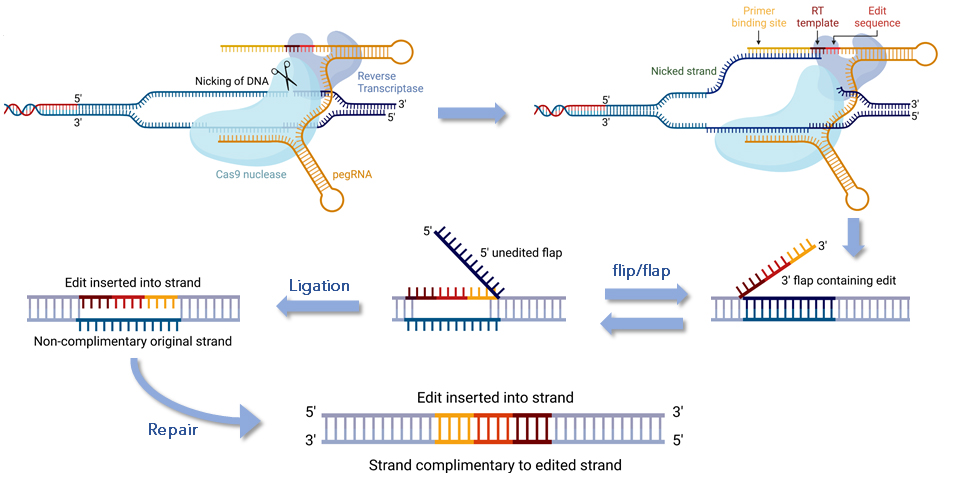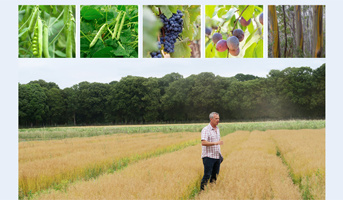PEPR Advanced Plant Breeding - 2 flagships and 1 decentralised infrastructure managed by the IJPB
Scientific launch
September 22, 2023 marks the scientific launch of the PEPR Advanced Plant Breeding. This research program is led by INRAE, with Isabelle Litrico as program director. It was announced by the government in November 2021 and has a budget of 30 million euros for 8 years. The program will mobilize all available knowledge and technologies in plant breeding to select new species and traits conducive to agro-ecological transition and climate change adaptation.
The TYPEX project, one of the four PEPR flagships, aims to develop robust and efficient prime editing tools for predictive genome editing in plants, using three model plants.
A platform for managing cloning strategies and collecting optimized CRISPR modules for efficient use of prime editing in different field plants will be created. Finally, the project will develop original strategies for genome editing of so-called recalcitrant plants. In short, TYPEX will strengthen France's research and breeding capacity in terms of precise plant breeding in a wide range of plant species.
The project involves the teams of Catherine Rameau, SAS, and Fabien Nogué, DRAGON.
This PEPR also includes the flagship DIALOGS dedicated to the evaluation of innovative agroecological systems. It will be built on the principle of multi-stakeholder interdisciplinary collaboration and will involve geneticists, agronomists, ecophysiologists, sociologists, economists, and stakeholders (sectors, technical institutes, and farmers) in the project. The goal is to develop and evaluate one or more low-input annual cropping systems that integrate crops in mixtures with other crops or as intercrops to provide ecosystem services. Desired ideotypes and associated traits will be defined and then selected from existing variability or through genome editing in the target species. Finally, the target varieties will be evaluated under real field conditions in the different cropping systems selected.
The consortium, led by Jean-Denis Faure, DIPOL team, will be completed after an initial joint set-up phase.
In addition to the specific research projects supported under this framework, this PEPR Advanced Plant Breeding will establish a network of public laboratories, a decentralised infrastructure aimed at strengthening methodological capabilities in plant genome editing and ensuring their dissemination to the national research community.
Pierre Hilson, BCR team, is responsible for the establishment and collegial management of this distributed infrastructure.

The TYPEX project, one of the four PEPR flagships, aims to develop robust and efficient prime editing tools for predictive genome editing in plants, using three model plants.
Mode of action of Prime Editing:


A platform for managing cloning strategies and collecting optimized CRISPR modules for efficient use of prime editing in different field plants will be created. Finally, the project will develop original strategies for genome editing of so-called recalcitrant plants. In short, TYPEX will strengthen France's research and breeding capacity in terms of precise plant breeding in a wide range of plant species.
The project involves the teams of Catherine Rameau, SAS, and Fabien Nogué, DRAGON.
This PEPR also includes the flagship DIALOGS dedicated to the evaluation of innovative agroecological systems. It will be built on the principle of multi-stakeholder interdisciplinary collaboration and will involve geneticists, agronomists, ecophysiologists, sociologists, economists, and stakeholders (sectors, technical institutes, and farmers) in the project. The goal is to develop and evaluate one or more low-input annual cropping systems that integrate crops in mixtures with other crops or as intercrops to provide ecosystem services. Desired ideotypes and associated traits will be defined and then selected from existing variability or through genome editing in the target species. Finally, the target varieties will be evaluated under real field conditions in the different cropping systems selected.
The consortium, led by Jean-Denis Faure, DIPOL team, will be completed after an initial joint set-up phase.
In addition to the specific research projects supported under this framework, this PEPR Advanced Plant Breeding will establish a network of public laboratories, a decentralised infrastructure aimed at strengthening methodological capabilities in plant genome editing and ensuring their dissemination to the national research community.
Pierre Hilson, BCR team, is responsible for the establishment and collegial management of this distributed infrastructure.

Back
